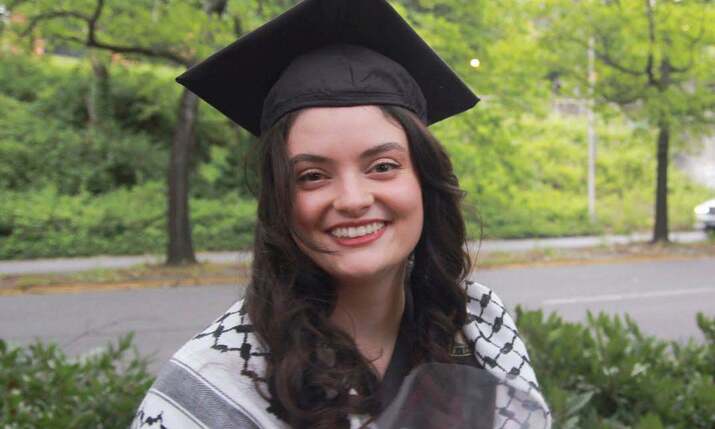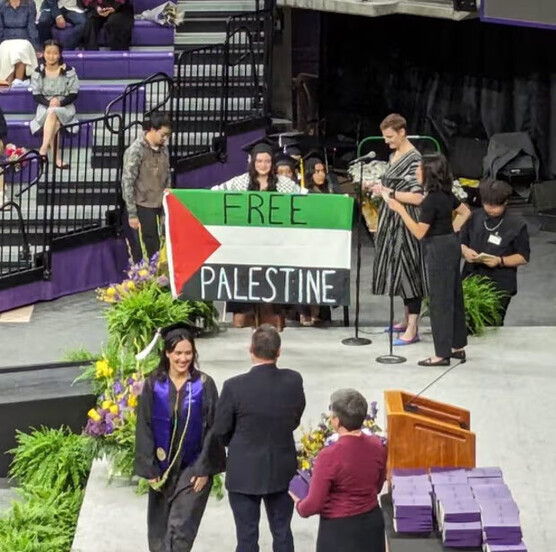- cross-posted to:
- worldnews@civilloquy.com
- palestine@lemmy.ml
- palestine@lemmy.ml
American killed in West Bank was longtime activist ‘bearing witness to oppression’, friends say
Ayşenur Eygi ‘was not a naive traveler – This experience was the culmination of all her years of activism’, says professor
by Sam Levin in Los Angeles Sat 7 Sep 2024 00.48 BST
 |
|---|
| Ayşenur Ezgi Eygi, at her graduation from the University of Washington earlier this year (Eygi family/International Solidarity Movement/AP) |
Ayşenur Ezgi Eygi, a 26-year-old American activist killed while protesting in the occupied West Bank, was remembered by friends and former professors as a dedicated organizer who felt a strong moral obligation to bring attention to the plight of Palestinians.
“I begged her not to go, but she had this deep conviction that she wanted to participate in the tradition of bearing witness to the oppression of people and their dignified resilience,” said Aria Fani, a professor of Middle Eastern languages and cultures at the University of Washington (UW) in Seattle, which Eygi attended. “She fought injustice truly wherever it was.”
Fani, who had become close with Eygi over the last year, spoke to the Guardian on Friday afternoon, hours after news of her death sparked international outrage. Eygi was volunteering with the anti-occupation International Solidarity Movement when Israeli soldiers fatally shot her, according to Palestinian officials and two witnesses who spoke to the Associated Press. Two doctors told the AP she was shot in the head. The Israel Defense Forces (IDF) has said it was investigating a report that troops had killed a foreign national while firing at an “instigator of violent activity”, and the White House has said it was “deeply disturbed” by the killing and called for an inquiry.
Eygi, who is also a Turkish citizen and leaves behind her husband, graduated from UW earlier this year with a major in psychology and minor in Middle Eastern languages and culture, Fani said. She walked the stage with a large “Free Palestine” flag during the ceremony, Fani said.
 |
|---|
| Ayşenur Ezgi Eygi (top) at her graduation (Courtesy of Aria Fani) |
The professor said the two met when he was giving a guest lecture in a course on feminist cinema of the Middle East and he spoke of his own experience protesting in the West Bank in 2013.
“I had no idea she would then be inspired to take on a similar experience,” he said, recounting how she reached out to him for advice as she prepared to join the International Solidarity Movement. “I tried to discourage her, but from a very weak position, since I’d already done it myself. She was very, very principled in her activism in this short life that she lived.”
In her final academic year, she devoted significant time “researching and speaking to Palestinians and talking about their historical trauma”, Fani said. “She was incredibly well-informed of what life was like in the West Bank. She was not a naive traveler. This experience was the culmination of all her years of activism.”
She fought injustice truly wherever it was
Aria Fani, University of Washington in Seattle
Eygi was an organizer with the Popular University for Gaza Liberated Zone on UW’s campus, one of dozens of pro-Palestinian encampments established during protests in the spring, he said. “She was an instrumental part of … protesting the university’s ties to Boeing and Israel and spearheading negotiations with the UW administration,” Fani said. “It mattered to her so much. I’d see her sometimes after she’d only slept for an hour or two. I’d tell her to take a nap. And she’d say: ‘Nope, I have other things to do.’ She dedicated so much, and managed to graduate on top of it, which is just astounding.”
He warned her of the violence he had faced in the West Bank, including teargas, and he feared deeply for her safety: “I thought, worst-case scenario, she’d come back losing a limb. I had no idea she’d be coming back wrapped in a shroud,” he said.
Eygi had also previously protested the oil pipeline on the Standing Rock reservation, and was critical of Turkish nationalism and violence against Kurdish minorities, Fani said: “She was very critical of US foreign policy and white supremacy in the US, and Israel was no exception.”
Carrie Perrin, academic services director of UW’s psychology department, told the Seattle Times in an email that Eygi was a friend and a “bright light who carried with her warmth and compassion”, adding: “Her communities were made better by her life and her death leaves hearts breaking around the world today.”
Ana Mari Cauce, the UW president, said Eygi had been a peer mentor in psychology who “helped welcome new students to the department and provided a positive influence in their lives”.
Fani said Eygi had been deeply dismayed by the UW administration’s handling of campus protests, and that he hoped her killing would encourage campus administrators across the country to end their crackdowns on pro-Palestinian activism.
Eygi’s killing drew immediate comparisons to the 2003 killing of Rachel Corrie, a 23-year-old American, also from Washington state, who was killed by an Israeli army bulldozer while protesting the military’s destruction of homes in Rafah with the International Solidarity Movement (ISM).
ISM said in a statement that the group had been engaged in a peaceful, weekly demonstration before Israeli forces shot Eygi: “The demonstration, which primarily involved men and children praying, was met with force from the Israeli army stationed on a hill.”
Eygi’s family released a statement on Saturday through the ISM, calling for an independent investigation to “ensure full accountability for the guilty parties”, and remembering Eygi as a “loving daughter, sister, partner, and aunt”.
“She was gentle, brave, silly, supportive, and a ray of sunshine,” her family said. “She wore her heart on her sleeves. She felt a deep responsibility to serve others and lived a life of caring for those in need with action. She was a fiercely passionate human rights activist her whole life – a steadfast and staunch advocate of justice.”
Fani and a colleague spoke earlier about the irony of her killing garnering an international response, he said: “She wanted to bring attention to the suffering of Palestinians. And if she were alive right now, she’d say: ‘I got that attention because I’m an American citizen, because Palestinians have become a number. The human cost has been strategically hidden from the American public and certainly from the Israeli public.’ … Obviously this is not the outcome she would have wanted, but it is just so poetic, in such a twisted, stomach-churning way, that she went this way.”
The professor recounted the musicality in the way Eygi spoke, and said he used to joke that he wanted to study her voice: “She was so easy to talk to and truly an embodiment of the meaning of her name, Ayşenur, which is ‘life and light’. She was just an incredibly beautiful person and good friend and the world is a worse place without her.”



“The Israeli forces are saying that they might have hit Aysenur unintentionally - that she was not a target” … “but aimed at the key instigator of the riot”. The UN says Aysenur was “shot in the head” because the perpetrators said protestors “burned tyres and hurled rocks towards security forces”
https://aje.io/yjbpo7
The sniper shot her in the head. ISM said there was no activity at the time of the murder
Yeah, I heard it happened 30 minutes after some activity got dissolved. (I don’t have a source offhand for that.)
I deliberately chose to quote the words of the perpetrator, and the UN as a recognized observer, because the perpetrator incriminates themselves
That’s going to be a “he said, she said” case. Chances are, since she was an activist in the US, that she might’ve been labeled as an “instigator” in whatever ID database they are using.
Credibility matters. The Israeli military is committing a genocide, they murder civilians daily for the past year. Numerous hunnan rights groups found the Israeli military to blatently lie and cover up war crimes.
ISM has always been a nonviolent group. They don’t use weapons. They don’t kill civilians. They have been doing human rights work for over a decade, and they remain a credible source.
Always ‘deliberatie action with pinpoint precision’ unless collateral damage reaches the press